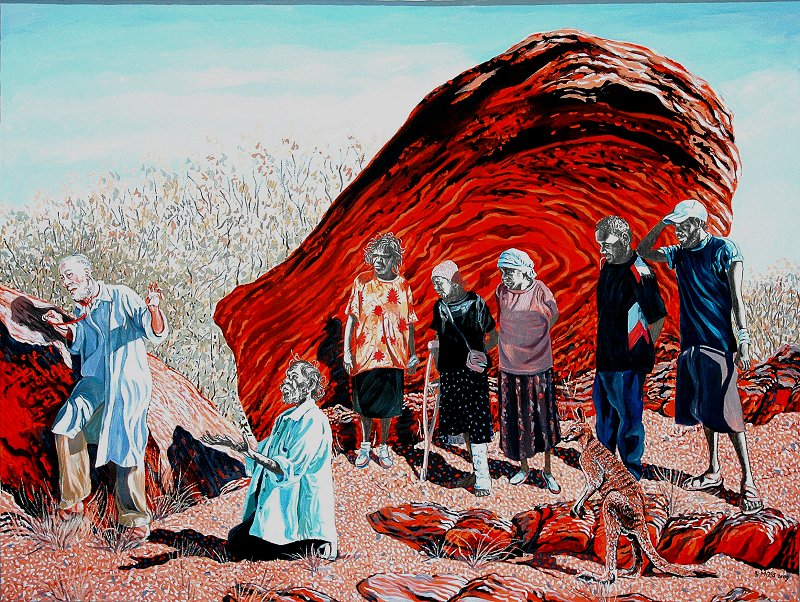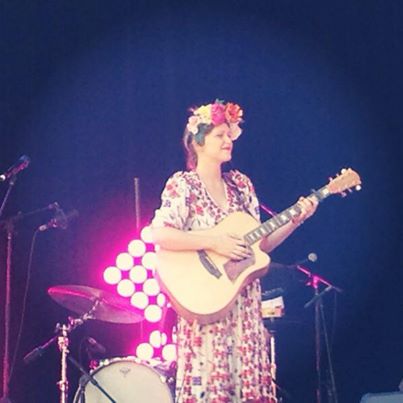Early visits to Womadelaide exposed audiences to plentiful Jewish song, to Ladino and Hebrew, to Jewish and Israeli musicians, cantors, singers and folklorists.
Since Israel’s Gaza operations I find the Womadelaide landscape depleted of that Jewish and Israeli richness. That portion of the landscape has narrowed, possibly as a pioneering and undeclared expression of BDS, possibly as a coincidence. Of late Jewish people have encountered a lot of coincidence.
***
The guitarist of Tinpan Orange walks quietly onto the stage, as one might who lacks a foreskin.
I know his state: I circumcised him. (Does Womadelaide realise?)
The prepuceless one sings discreetly, sweetly, alongside the keyboardist and the violinist, as Emily his sister, publicly pregnant and wearing fruit and flowers in her hair, takes centre stage.
I know and love them so I have nothing dispassionate to say about this group, but the Frenchman sitting next to me on the grass murmurs his pleasure in the small quietness that follows every song.
At the conclusion of the concert the Frenchman stands and stretches, and we exchange slow smiles as we do after sleeping on a plane; as we do
upon waking with a person whose name we will never know, one with whom we have shared an hour of pleasure. The Frenchman says: I am at this festival three days now, and I listen to many concerts. This one is the most beautiful. This is the best, with Hanggai.
Hanggai is a gaggle of old Mongols that fiddle and bellow and sing. A couple of men of picturesque antiquity occupy either extremity of front stage wearing rags that upon closer examination are national dress. The two bow their traditional fiddles with a solemnity that belies the leaping tempi of their tunes. Behind them are instrumentalists, half-seen, whose clamorous attack upon percussion never amounts to an assertion of personality or individuality. The bellows at centre stage is a weight lifter, semi-nude in his cut-away jerkin of dyed and carved cowhide. His latissumus dorsi and pectoralis muscles are exclamation marks, his biceps are upper case. He strides to and from the edge of the stage, a lion pacing out his territory, his voice a roar.
He enjoys a good deal of self-approval in his imagined kingdom. We in the audience are charmed and amused.
And then Hanggai sings. A drone flows and rises from somewhere, higher notes join with a pounding bass, rhythmic sounds gain power and tempo, building and building to a pitch that swamps physiology: my chest is an echo chamber that pounds and vibrates to a beating from without. What is that sound? That deep, deep vibration coming from under ground, or rumbling from clouds unseen? On it drones, constant yet syllabic, hinting at a human source.
I glance to the thin old men, seated, as all leap and throb and swing about them. Sedate, studious, swinging chicken wing arms in their bowing, fiddling and singing.
From one of the two that sound emerges, that throat singing which is the group’s aural autograph. The throat releases its unearthing power through a mouth that smiles withal. I rest my pleasuring eyes upon the fiddlers: their eyes, their sparkling eyes, are gay.
Carminho is introduced as a fado singer. She personifies (as I am informed by the braziliophone seated behind me) a classic grammatical contradiction. That is, “fado” signifies a singer is in the masculine gender while this singer is feminine. Every line, every phrase of her Portuguese lament (never really a song) seems to end in the “u” sound (heard as in “tutu”, but spelled “o”, the suffix of the masculine). After applause that never rises beyond the perfunctory, the singer thanks us: “Obligattu/o”. A woman would properly say “Obligatta”, murmurs the braziliophone. The singer is a woman lamenting, even thanking, in a man’s grammar.
I sit on the grass, one of a teeming multitude, all steaming in the Adelaide heat. The woman starts with a moan that rises quickly to a scream, her willow frame erect even as her voice shakes and shrieks and dissolves into staccato sobs. Portuguese seems to be a relative of Spanish – here, greeting a loved one, Carminho sings buon dia, amor –(good day, beloved) – but the words lack the flowing sweetness of Spanish. Portuguese, at least in fado, must be chewed and swallowed or spat out. Fado, like the Argentine bandoneon, is an instrument without a single happy note. And that is what we have come here for. For the fado, the Portuguese cry of pain, of fate. But I find this singer lacking in depth. She lacks – or neglects – the lower vocal register. However all about on the grass are figures and faces that are rapt, absorbed. Only half engaged myself I muse upon the crowd. Here are olive-skinned faces old enough to remember sons, brothers, husbands, lost in the colonies, in the wars, in Angola and Mozambique. And here are African faces, African voices conversing in Portuguese: these might have been the colonized. Fado carries the griefs of their losses too.
Afterwards my family and I exchange impressions. I am the only one who feels disappointed. Remembering Maritza, haunted by Maritza who sang here four or five years ago, I experienced anti-climax today. For me, Maritza’s is the authentic sound: I like a look of agony because I know it’s true.
My family recalls Maritza too and concedes the difference. That’s why they enjoyed Carminho better. Carminho is not a complete stranger to the light, to human joy.
Finally, Pokey La Farge. Pokey is as good as his name. This man is the antithesis of the fado singer, his music the roughhouse stuff of mid-west America. Harmonicas wail and rattle, fiddles fiddle, other strings are plucked in a frenzy, while bow-tied in his chequered shirt and his braces, Pokey paces the stage exhaling his riotous self-satisfaction in rollicking song.
And we in the audience, we inhale it deeply. The only times a saw a crowd of people so deeply and broadly happy were 1968, 1990 and 2010. And on those occasions the heavens smiled too, for Collingwood had won the premiership.

